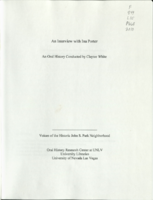Search the Special Collections and Archives Portal
Search Results

Transcript of interview with Justice Michael Cherry by Barbara Tabach, September 19, 2014
Date
Archival Collection
Description
Interview with Justice Michael Cherry by Barbara Tabach on September 19, 2014. In this interview, Justice Cherry talks about how he came to Las Vegas and his work as a public defender and as a lawyer in private practice. He also discusses his involvement with Jewish organizations in various capacities, and his involvement with high-profile cases such as the MGM Grand and Las Vegas Hilton fires, earning him the nickname "master of disaster."
Justice Michael Cherry was born in St. Louis, Missouri, and went on to spend his childhood in the Jewish neighborhood of University City. He attended University of Missouri and became a leader in his fraternity, Alpha Epsilon Pi, and a committed ROTC cadet. By the time Justice Cherry graduated from Missouri and was heading to Washington University School of Law, he was a second lieutenant; halfway through law school, he was promoted to first lieutenant. It was also during law school that he married his college sweetheart, Rachel Wolfson. When a bad back prevented him from becoming an active air force officer, he and his wife decided to follow his mother to Las Vegas. Justice Cherry worked both as a law clerk with the Public Defender's Office as well as a security guard at Wonder World when he first moved to the city. After passing the Nevada bar, Cherry took at position with the Public Defender's Office, and later went into private practice as a successful criminal defense attorney. Cherry was elected as district judge in 1998 and 2002. In 2006, he won his campaign for state Supreme Court justice. Justice Cherry was reelected to office in 2012 for another four-year term. He is currently the highest-positioned Jewish official in the state of Nevada. Throughout his years in Las Vegas, Justice Cherry has been an extremely active and influential member of the Jewish community and served as chairman of the Anti-Defamation League and is active in the Jewish Federation. Justice Cherry attributes his commitment to service to his mother. In addition to his service to the Jewish community, he has been active in numerous other service organizations, including March of Dimes, Olive Crest, Adoption Exchange and American Cancer Society.
Text

Transcript of interview with Ina Porter by Claytee White, January 5, 2010
Date
Archival Collection
Description
Ina Porter recalls the story of choosing to move to the John S. Park Neighborhood in the 1940s. She and her husband Burdell were accustom to paying cash for everything and needed to establish credit with Sears to purchase their $5000 home, which was not considered inexpensive. They were among the earlier homeowners and soon the neighborhood grew to include a Mormon Church that would become so integral to the Porter family's life and to the John S. Park community. Ina was born 1917 in the small southern Utah town of Kanab. She describes her youth and speaks of the Great Depression. Ina graduated from high school in 1935, married in 1936 and moved to Las Vegas, where there were jobs for her husband. Finding work after his graduation from college was not easy, but because he had been a bus driver he was able to secure a position driving a bus for the Union Pacific Railroad and later Greyhound Bus Line. Years later Ina, Burdell and their family were part of the fiber of the Joh
Text

Transcript of interview with Rita Deanin Abbey by Claytee White, November 29, 2014 and February 26, 2015
Date
Archival Collection
Description
Rita Deanin Abbey is an Emeritus Professor of Art at the University of Nevada, Las Vegas. She taught drawing, painting, and color theory and innovated interdisciplinary courses with the sciences at UNLV from 1965 to 1987. The University of Nevada, Las Vegas, Marjorie Barrick Museum and the Palm Springs Desert Museum (presently Palm Springs Art Museum), Palm Springs, CA collaborated to present the Rita Deanin Abbey 35 Year Retrospective, which was held February 16-March 5,1988 at UNLV and March 25-June 5,1988 at the Palm Springs Art Museum. Abbey received her Bachelor of Fine Arts degree in 1952 and her Master of Arts degree in 1954 from the University of New Mexico, Albuquerque, NM. She also studied at Goddard College, Plainfield, VT; the Art Student s League, Woodstock, NY; the Fians Hofmann School of Fine Arts, Provincetown, MA; and the San Francisco Art Institute, San Francisco, CA. She was an artist in residence in the studios of Toshi Yoshida, Tokyo, Japan, John Killmaster, Boise, ID; Methow Iron Works, Twisp, WA; Tamarind Institute, University of New Mexico, Albuquerque, NM; the Mason Gross School of the Arts, Rutgers, The State University of New Jersey, New Brunswick, NJ; Shidoni Foundry, Tesuque, NM; Bill Weaver Studio, Chupadero, NM; Savoy Studios, Portland, OR; and Carlson & Co., San Fernando, CA. Abbey, who works in the areas of painting, drawing, printmaking, sculpture, porcelain enamel fired on steel, stained-glass, and computer art, has had 60 individual exhibitions and has participated in over 200 national and international group exhibitions. She is represented in private and public collections in the United States, the Middle East, Europe, and South America. Abbey has published several articles in journals, and six books: Rivertrip, Northland Press, Flagstaff, AZ, 1977; Art and Geology: Expressive Aspects of the Desert, Peregrine Smith Books, Layton, UT, 1986 (co-authored by G. William Fiero); the Rita Deanin Abbey Rio Grande Series, Gan Or, Las Vegas, NV, 1996; In Praise of Bristlecone Pines, The Artists' Press, Johannesburg (presently located in White River), South Africa, 2000; Isaiah Stained- Glass Windows, Gan Or, Las Vegas, NV, 2002; Seeds Yet Ever Secret, Poems and Images, Gan Or, Las Vegas, NV, 2013. She has been the recipient of many commissions and grants and has won several awards, including the Bicentennial Commission for the State of Nevada, 1976; the Governor's Seventh Annual Visual Arts Award for the State of Nevada, 1986; and the Chairman's Award of Excellence at the 1987 International Exhibition of Enamelling Art, Ueno Royal Museum, Tokyo, Japan. From 1988-1990, Abbey fabricated Northwind, a steel sculpture (17ft. x 27 ft. 5 in. x 25 ft. 10 in., 7 tons), installed in Las Vegas, NV. Abbey was invited by the Gallery Association of New York State to exhibit four of her works in its 1989-1991 traveling exhibition, Color and Image: Recent American Enamels. In 1992, the Markus Galleries, Las Vegas, NV, and the Nevada Symphony presented an exhibition of art by Abbey, which inspired Virko Baley s Piano Concerto No. 1. The world premiere performance of the concerto was held in 1993 at the National Opera House, Kiev, Ukraine. In 1993, Abbey constructed Spirit Tower, a cor-ten steel sculpture (20 ft., 11 tons), which was commissioned by the Las Vegas-Clark County Library District for the Summerlin Library and Performing Arts Center. Abbey was invited by the Pacific Division of the American Association for the Advancement of Science to lecture on Art and Geology at San Francisco State University for the 75th Annual Meeting, on June 19-24,1994. She was one of three artists from the United States invited to participate in the exhibition, Enamel Today, at Villa am Aabach, Uster, Switzerland, June-July, 1995. Additionally in 1995, Abbey completed a series of cast bronze sculptures at Shidoni Foundry, Tesuque, New Mexico. Commissioned in 1998, Abbey completed the Isaiah Stained-Glass Windows in 2000, sixteen 10 ft. x 2 ft. stained-glass windows for the main sanctuary of Temple Beth Sholom, Las Vegas, NV. Also in 2000, she completed Holocaust, a stainless steel sculpture (14 ft. 3 in., 4.5 tons), installed in Las Vegas, NV. In 2003 her bronze sculpture, Ner Tamid, was installed in Temple Adat Ami, Las Vegas, NV. Snakewash, a cor-ten steel ground sculpture (62 ft.), was completed in November 2003. Abbey fabricated steel sculptures and cast small and large bronzes from 2004 through the present. In 2006 she completed and installed Guardian of All Directions, a stainless steel sculpture (14 ft., 1.5 tons). The Guggenheim Hermitage Museum and Young Collectors Council visited the studio and home of Rita Deanin Abbey, Las Vegas, Nevada October 15, 2006. During March 2008, Women's History Month, Abbey was recognized for her contributions to the Arts by Mayor Goodman and Members of the Las Vegas City Council. Hidden Pass, a 2-inch steel plate sculpture (16 x 28 ft. 8 in. x 13 ft., 22 tons), was installed in 2010. Between July 16-December 23, 2011, Abbey exhibited in Blast from the Past, '60s & '70s Geometric Abstraction at Palm Springs Art Museum, Palm Springs, California. The City of Las Vegas Office of Cultural Affairs, Las Vegas Arts Commission presented Abbey the Lifetime Achievement Award for Excellence in the Arts on May 25, 2012. Balanced Arc, an outdoor bronze sculpture (8ft. 8 in. x 9 ft. x 7 ft. 4 in., 1600 lbs.), completed in 2012, was installed in April 2013. The Western Museums Association 2014 Annual Meeting in Las Vegas, NV, toured The Art of Rita Deanin Abbey at the Desert Space Museum October 5, 2014. Abbey participated in the fall group exhibition Macrocosm/Microcosm: Abstract Expressionism in the American Southwest at the Fred Jones Jr. Museum of Art, University of Oklahoma, Norman, Oklahoma, October 2, 2014-January 4, 2015. Her artwork was also shown in the Recent Acquisitions exhibition at the Marjorie Barrick Museum, University of Nevada, Las Vegas, June 19-September 19, 2015. Currently, Abbey is working on new sculptures, paintings, and enamels. vii
Text

Transcript of interview with Eva Garcia Mendoza by Elsa Lopez and Barbara Tabach, September 25, 2018
Date
Archival Collection
Description
On the corner of 7th street and Clark, and beside the tennis courts of Las Vegas Academy, stands the law office of attorney Eva Garcia Mendoza. Eva has worked in her office since 1982, and in this time she has helped the Las Vegas community work through civil and immigration cases besides aiding in a myriad of other ways. Eva Garcia Mendoza was born in 1950, in the town of McAllen, TX-an environment that perpetuated hatred of Mexican Americans. Eva recalls the racism she endured; for instance, being spanked if she spoke Spanish in school, and her family facing job discrimination because of her skin color or her last name. Being an ethnic and financial minority was difficult, and Eva remembers nights as a child when she would cry herself to sleep. Eva showed resilience in the face of adversity as she states, “you rise to the level of your teachers’ expectations.” With the encouragement of her band professor, Dr. L.M Snavely, she began higher education at Pan American College. She moved to Las Vegas in 1971 and began to work before being accepted at UNLV to study Spanish literature. She graduated in the class of 1973. In 1975, Eva applied to become a court interpreter, a decision that would drastically change the trajectory of her career. She earned the coveted position and began to work beside Judge John Mendoza who was the first Latino elected to public office in the state of Nevada. Several years later John and Eva would wed. Judge Mendoza passed away in 2011. Eva talks about how extraordinary his legacy is-from his professional achievements to a story about his v football days and the 1944 Dream Team, this true story even piqued the interest of Hollywood writers. Through her work, Eva began to notice how she was more than qualified to become a lawyer herself, so she applied and gained a full ride scholarship to the Law School of San Diego University. Eva describes the struggles of attending school in San Diego while her spouse and children were home in Las Vegas. Despite the financial difficulties, being one of few minority students, and becoming pregnant her second year, Eva was able to finish her remaining university credits by returning to Las Vegas and working with Judge Mendoza. Together, they started the Latin Bar Association. Eva began her own practice in 1981 and would later partner with Luther Snavely, who was the son of her band teacher that helped her to attend college so many years back. Today, Eva has a new partner at her office and hired her son to work as a secretary. Eva also tells of the office’s mysterious history, of which includes a ghostly figure many clients claimed to have seen in the reception room. Eva recounts many of her professional achievements, such as petitioning to start the American Immigration Lawyers Association, Nevada Chapter, representing celebrities, winning the unwinnable cases such as against the Nevada Test Site. Eva talks about current events, such as today’s immigration laws, the discriminatory practices of revoking birth certificates from those born in Brownsville, TX., and about the importance of the #MeToo movement. Eva and her family have a great fondness for Las Vegas. The support for the Latinx community in Las Vegas greatly contrasts that which she experienced as a child in southern Texas. She describes wanting to take her children and grandchildren to visit her old home in McAllen, TX where her family grew up on the “wrong side of the tracks.”
Text

Transcript of interview with Barbara Agonia by Suzanne Becker, September 17, 2007, September 25, 2010, & October 2, 2007
Date
Archival Collection
Description
When Barbara Agonia arrived in Las Vegas in 1969 to pursue a Master's Degree in English, the University of Nevada Las Vegas was barely ten years old and the population of Las Vegas was just approaching 160,000 residents. At the time, she was 35 years-old and it was a decision and move that would forever change her life and higher education in Clark County. Barbara Agonia was born in St. Louis, Missouri, in 1934 to Robert Lewis Klinefelter and Suzanne Carter Klinefelter. At the time of Barbara's birth, her father worked for Brown Shoe Company in St. Louis. The family moved to Bunker Hill, Illinois when Barbara was still an infant. This was Mr. Klinefelter's hometown where a portion of the extended family still resided. In the late 1930s, Mr. Klinefelter got a job in a brass mill near Alton, Illinois, and he commuted there daily. When the United States entered World War II, Mr. Klinefelter tried to enlist in the army, but was rejected because he had two small children and because he worked in an essential industry. He decided to work in a non-essential industry and took a job at Montgomery Ward in Oak Park, Illinois. Barbara was in the third grade that year. Still unable to enlist, Mr. Klinefelter moved the family to Wabash, Indiana, and began working for General Tire in 1943. They moved to Logansport, Indiana in 1947. Agonia recounts that education has always been a significant part of her life, with the importance of a good education stressed in her life from early childhood forward. After graduating from high school in Logansport, Indiana, she attended Hanover College in southern Indiana, enrolling in 1952. Her educational experience at Hanover included a year studying abroad at the University of Exeter in Devonshire, England—an experience which Agonia credits as further cementing her commitment to education and her love of literature and language. She graduated from Hanover in 1957 with a double major in English and speech/ theater. Agonia spent her first years out of college teaching high school English, speech, and theater in west central Illinois and the next eight in northern Illinois. A little over ten years into her career, at the age of 35, she decided to pursue a Master's degree in English. Her sister, Martha, who at the time lived in Las Vegas, suggested checking into programs offered at the city's newly formed university. In 1969, Barbara moved to Las Vegas and enrolled in the English Department at UNLV. As Agonia was completing her degree in 1971, the community college system in Nevada was emerging and seeking faculty for the up and coming institution. Curious to know more about the new system, Agonia scheduled a meeting with the person in charge of hiring. Two hours later, she walked out with a contract in her hand, one of eight new faculty members at Clark County Community College, now known as College of Southern Nevada. In her early years with the college, Agonia did a great deal of public speaking on behalf on the newly formed system, promoting the new institution and reaching out to potential students. At the same time, she taught full course loads in composition and literature, and eventually became chair of the English department. Her new position and public speaking work on behalf of the college not only provided her contact with the local Las Vegas community, it ultimately became the catalyst in spurring her passion for community involvement, particularly working on behalf of women within the community. • • Vll As the 1980s approached, Agonia became actively involved in rape crisis education, at the urging of Florence McClure. Then, in 1980, Agonia was again in on the ground floor of community programming, when she and Beverly Funk, at the urging of Judith Eaton, the president of Clark County Community College, established a Women's Center on campus. The Center was initially set up to help women in a variety of life circumstances, including women who were wanting to return to school or who were new to the process of school altogether. The center eventually became the Re-Entry Center offering skill development, tutoring programs, and other forms of assistance for anyone interested in returning to school. In addition to her involvement in and commitment to public education, Agonia has also been involved in the Soroptimist International organization for business and professional women who work to improve the lives of women and girls in local and international communities. In the Las Vegas area, Soroptimist International of Greater Las Vegas worked to establish the Rape Crisis Center and the Center for Domestic Violence, which later became SafeNest. Agonia has been working with the organization since 1982. Through Soroptimist International, she also became involved in Friends of the Nevada Wilderness, an organization devoted to designation and long-term protection of Nevada's wilderness areas. As the representative for Soroptimist International, she traveled to Washington to lobby and testify in front of the senate for the establishment of Great Basin National Park. Agonia's work in the Las Vegas community over the past forty years has been significant. She counts Florence McClure, Geneva Douglas, and Jean Ford amongst her greatest influences. As she notes in her oral history, "I learned how to be radical from those women." She happily embraces the label of radical. This attitude surfaces throughout Agonia's experiences and recollections, and underscores her work and dedication to the interplay of local education and women's issues within Nevada.
Text

Cindy Baca oral history interview: transcript
Date
Archival Collection
Description
Oral history interview with Cindy Baca conducted by Barbara Tabach on May 22, 2019 for the Remembering 1 October Oral History Project. Cindy Baca, born and raised in Las Vegas, talks about her family and occupation as a librarian at Escobedo Middle School. Cindy's twin daughters were present and injured during the Route 91 Festival and October 1 shooting. She describes their experiences and the Random Acts of Kindness project she piloted at her school after the incident.
Text

Transcript of interview with Susan Jones Watson by Claytee White, February 20, 2013
Date
Archival Collection
Description
A resident of Southern Nevada from the age of three, Susan Watson shares her memories of growing up and living in Las Vegas. After a year in Boulder City, Susan's father bought an old army barrack and converted it to a home in North Las Vegas; Susan remembers playing in the desert with her siblings and attending elementary and middle school before starting at Rancho High. Watching her mother design costumes for Strip performers and beautiful dresses for her own high school dances no doubt helped Susan develop her own sense of taste and style - something that she would put to good use over many years as an interior designer. Before that though, Susan shares her memories of what life was like in the Las Vegas of the 1950s and 1960s: cruising Fremont Street; movie nights; after-school work; favorite teachers; lunches on the lawn; and dance club. All combine to paint a vivid picture of a smaller town and a simpler time in the Las Vegas valley.
Text

Kimberly and William King oral history interview: transcript
Date
Archival Collection
Description
Oral history interview with Kimberly and William King conducted by Claytee D. White on November 27, 2017 for the Remembering 1 October Oral History Project. In this interview, Kimberly and William King discuss the October 2017 mass shooting in Las Vegas, Nevada and their experiences from that day. They talk about attending the Route 91 Harvest festival and their struggle to find safety and obtain medical medical attention for William after he was shot. Kimberly describes her feelings regarding the city prior to the shooting and how her perspective on Las Vegas has changed. The couple finish the interview with a discussion of life after the shooting, especially in regards to love and community.
Text

Linh Fee oral history interview: transcript
Date
Archival Collection
Description
Oral history interview with Linh Fee conducted by Cecilia Winchell, Stefani Evans, and Jerwin Tiu on February 4, 2022 for Reflections: The Las Vegas Asian American and Pacific Islander Oral History Project. Linh Fee talks about her family life growing up in Oahu, Hawaii, how her parents met in Vietnam, and memories of her childhood with her six siblings. She shares how she moved to Las Vegas, Nevada to find work after graduating from college at the University of Hawaii and her brief time working in the hospitality industry as a cocktail server. Fee discusses her career change to become a dental hygienist and life with her husband and three children.
Text

William O'Neill McCurdy Sr. oral history interview: transcript
Date
Archival Collection
Description
Oral history interview with William O'Neill McCurdy by Claytee D. White on January 26, 2022 for the African Americans in Las Vegas: A Collaborative Oral History Project. In this interview, McCurdy describes his childhood growing up in Las Vegas, Nevada, graduating from Valley High School, and attending Western Nevada College in Carson City, Nevada. He worked for many years for the Parks and Recreation department, and has served on numerous boards including the Citizens' Advisory for Regional Transportation (RTC), Habitat for Humanity Board of Director, Mineral County Economic Advisory Committee, City of Las Vegas Community Block Grant Advisory Board, and Southern Nevada Regional Housing Authority Commission. Currently, McCurdy owns McCurdy & McCurdy Media Group, a political consulting and advertising firm which has assisted numerous political candidates in fulfilling their dreams of helping to govern Las Vegas, Clark County, the State of Nevada, and even in the United States Congress.
Text
